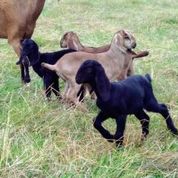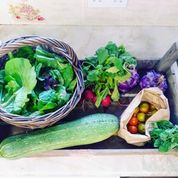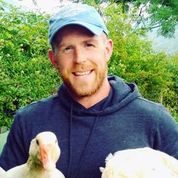Jubilee Community Benefit Society
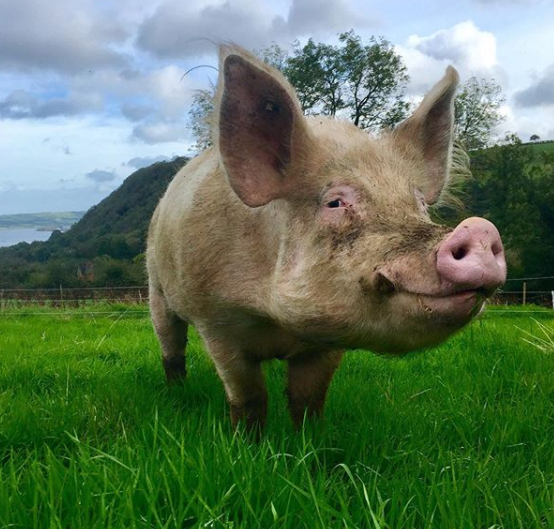
A community benefit farm, supported by churches and individuals, offering care farming to vulnerable adults and asylum seekers, vegetable boxes and a pig club, as well as education about environmental and animal welfare issues. It covers two communities: the geographical community of Larne which is people of all backgrounds and beliefs; and the community of interest – churches across Northern Ireland as a whole.
Key words: Care farm, asylum seekers, conservation, church
Short description
Name of the initiative? Jubilee Community Benefit Society
Country United Kingdom
Region Larne, Northern Ireland
What kind of initiative Farming/production, Marketing, Education/training, Environmental, Community
The Story
I had always wanted to be a farmer and a conservationist, but I didn’t have a farm. I dipped my fingers into a lot of pies over the years, but I wanted to set up something that mixes both agriculture and environmental and has community aspects as well. I was acutely aware, growing up in the church, that there was very limited focus on environmental issues. And while that may be changing now, there is still a lot of talk, with only a limited number of churches putting it into practice. I wanted to engage Christians with issues around farming and the environment, as well as people of other faiths and no faith.
“I was acutely aware, growing up in the church, that there was very limited focus on environmental issues. And while that may be changing now, there is still a lot of talk, with only a limited number of churches putting it into practice.”
I was studying in Cambridge and was part of a community farm there, when my wife had a relapse of ME. So we returned home in December 2013. The silver lining in that cloud was I knew by coming back to Northern Ireland the process of realising my grand agricultural vision was going to be set in motion, and from January 2014 I started to formally put flesh on the bones of that idea. All I’d learned from the community farm in Cambridgeshire, both what to do and what not to do, blossomed into a vision document. We started talking to others, having consultation meetings, and by August 2017 we were formally registered as a Community Benefit Society.
“We were left with vision, funding and support but with nowhere to put it.”
We were interested in the Community Benefit Society model particularly because of the community share method of it for raising capital. Originally, we were going to rent a beautiful walled garden with plans to run a café and restore the greenhouses. That fell apart for various reasons and we were left with a vision, some seed funding, lots of interest and support, because we’d done all the consultation based around this site. We were left with vision, funding and support but with nowhere to put it. So we started to look for a new site in February 2018. We found a little farm for sale. We had to raise £300 000 to purchase and equip it. By August 2018 we had enough to show the sellers we were seriously interested in buying the house and then we launched the rest of the community share offer to raise the rest of the money. By February 2019 we had raised it all from 155 member owners and quite a lot of churches, schools, cooperative foundations and some peer-to-peer loans so we were able to complete purchase of the farm.
“From the beginning, our mission and vision were set up around three C’s: Care, Community and Conservation.”
From the beginning, our mission and vision were set up around three C’s: Care, Community and Conservation. Care farming focused on the therapeutic value of working on the land with vulnerable groups. Community would cover food production along the lines of the Community Supported Agriculture (CSA) model. Then education engagement: schools, churches, internships, festivals, a catch-all for everything that didn’t fit into the first two categories!
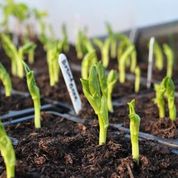 We spotted a gap with Care Farming. In Northern Ireland to date, Care Farming would have mostly been with adults with learning difficulties or mental health challenges, but no farms were working with refugees and asylum seekers. Growing up and going to an international school in Malawi, this is an interest I particularly have. We had links with a church organisation that runs a drop-in centre in Belfast, and they agreed to make referrals to us. So that was actually the very first thing: only a few days after we moved into the farmhouse we had our very first refugee Care Farming session, because there were so many things to do – we weren’t waiting for the farm to be ready for them to come and help us with. They come once a week by train or by car and got stuck into whatever needed doing: pouring concrete, fencing, hedge-laying, everything! That was special – that they were involved right from the beginning, and they’re still involved.
We spotted a gap with Care Farming. In Northern Ireland to date, Care Farming would have mostly been with adults with learning difficulties or mental health challenges, but no farms were working with refugees and asylum seekers. Growing up and going to an international school in Malawi, this is an interest I particularly have. We had links with a church organisation that runs a drop-in centre in Belfast, and they agreed to make referrals to us. So that was actually the very first thing: only a few days after we moved into the farmhouse we had our very first refugee Care Farming session, because there were so many things to do – we weren’t waiting for the farm to be ready for them to come and help us with. They come once a week by train or by car and got stuck into whatever needed doing: pouring concrete, fencing, hedge-laying, everything! That was special – that they were involved right from the beginning, and they’re still involved.
“…days after we moved into the farmhouse we had our very first refugee care farming session, because there were so many things to do – we weren’t waiting for the farm to be ready for them to come and help us with.”
We have since launched vegetable boxes and pig boxes, building relationships with those who receive them.
“…it’s a bit like an iceberg in that what you see now after a year of operations is just the tip of the iceberg, but prior to the farm being established it was five years of hard work and gradual building of relationships.”
Now we’re established at our current site and we’ve been featured recently in local and national media in Northern Ireland, people see us and think ‘you’ve done so much so quickly’, but it’s a bit like an iceberg in that what you see now after a year of operations is just the tip of the iceberg, but prior to the farm being established it was five years of hard work and gradual building of relationships with individuals. I was finishing my PHD part-time and looking after the kids part-time and whenever I had a spare evening, I would meet people and chat to them or organise consultation meetings so I would say that long-term investment in relationships is what has facilitated what appears to be rapid growth. It’s only rapid because it’s based on that foundation of relationships that has allowed collaboration and trust to grow. So that when you turn round and say ‘by the way, can you give us £300 000’, people take you seriously because you haven’t just thought of the idea, you’ve been working on it for years, and you’ve consulted with them and asked them ‘what do you think we should do?’ Having emotional and relational buy-in facilitated the financial buy-in necessary to purchase the farm and equip it.
“Having emotional and relational buy-in facilitated the financial buy-in necessary to purchase the farm and equip it.”
More challenging than finding the money was actually accessing land for the first time. If you’re not fortunate enough to have a farm in the family, accessing land is really very difficult. We’d thought renting the walled garden would be a good place to start, because we could just rent and hold our business model before we were ready to scale up and buy somewhere. But despite our best efforts and intentions that fell apart. A second site then fell though, and we were back to buying in the open market.
“More challenging than finding the money was actually accessing land for the first time.”
The estate agent was so skeptical about who we were. Even when we said we already had £165 000 in pledges, it was difficult to get him to take us seriously and to get a viewing arranged. It was amazing providence (some people might call it random chance) when we met the seller for the first time. He had taught at a college in 1950s with my grandmother at another place in Northern Ireland. That relationship clinched the deal. There was an immediate rapport. Up until that point it had been really really difficult. Raising the money by comparison was relatively easy!
The second challenge, now that we actually have the land, is bureaucracy. DAERA (The Northern Irish equivalent of DEFRA) can be really difficult to deal with. Personally and professionally, I believe in appropriate regulation, but now I’m in the position of being regulated by a regulator I find certain things very frustrating. They’re not used to dealing with small community farms like ours. We have to be patient – there is no way of not dealing with DAERA. And it’s not just public bureaucracy, we’ve also had a horrendous time dealing with banks. We’re just small fry for them. I don’t like bureaucracy. I like small nimble organisations with limited hierarchy and layers of admin – which is why I work in one!
“I don’t like bureaucracy. I like small nimble organisations with limited hierarchy and layers of admin – which is why I work in one!”
If I had my time again, I don’t think I would try to set up an organisation while trying to finish a PHD and raise a young family. It was too much. It required a great deal of energy and sacrifice and I’m not sure I would be willing to do that again. But, equally, it has got us to where we are.
“It required a great deal of energy and sacrifice and I’m not sure I would be willing to do that again. But, equally, it has got us to where we are.”
We were very fortunate to have a number of people with disposable money and legacies and they were willing to put that in or loan it to us at an early stage which anchored the finances of the project before we put out community shares. For anyone starting a community project without a wealthy founder it would really help to have some capital available at the start and over the first three years (when most organisations fail), and even in the pre-start-up phase. If someone can be paid a part-time salary it means they can devote two or three days a week just to get things off the ground. It would have really helped us. There have been times we’ve lived on the breadline, only being paid in food, and I was willing to do that, but other people wouldn’t or couldn’t.
“There have been times we’ve lived on the breadline, only being paid in food, and I was willing to do that, but other people wouldn’t or couldn’t.”
We’re spending more money than we planned to and are bringing in less than we planned to. We’re having to adapt to that. That’s partly why we’ve launched our church partnership programme and are applying for grants because that’s what we need to do financially.
Since January 2020, after several years of negotiations, we’ve expanded our Care Farming beyond refugees to receive referrals from the NHS Trust. There has been a lot of good will generated locally. We had a festival for our launch last year, internships and volunteer days. We’ve had a lot of constructive engagements with churches and Christian organisations who invite us to speak on Environmental issues. That impact is wonderful to see.
“We want people to come to the farm and marvel at the beauty of the place and understand where their food comes from.”
We want people to come to the farm and marvel at the beauty of the place and understand where their food comes from. We have ambassadors who host parties and serve our pork and talk about Jubilee Farm, leading to discussions around animal welfare.
On a European level and particularly in England, established churches often tend to be large landowners. Manses sometimes sit on ten acres of land which is tenanted out. I believe it shouldn’t just be about money – just renting it out for an income is the easy option, but there could be a much bolder vision: using that land to facilitate community groups or be open to people like myself who want access to land but struggle to get a foothold into it.
Additional information
https://www.facebook.com/jubilee.coop/
https://www.instagram.com/jubilee.coop/
https://twitter.com/jubilee_coop
—
Repository compiled June 2020 by: Jonny Hanson
E-mail contact: mail@jubilee.coop

